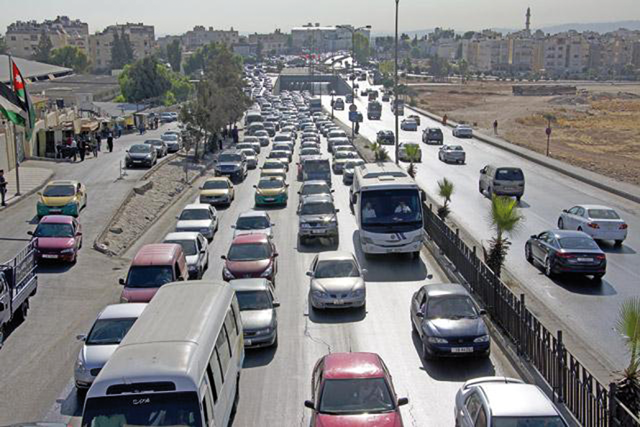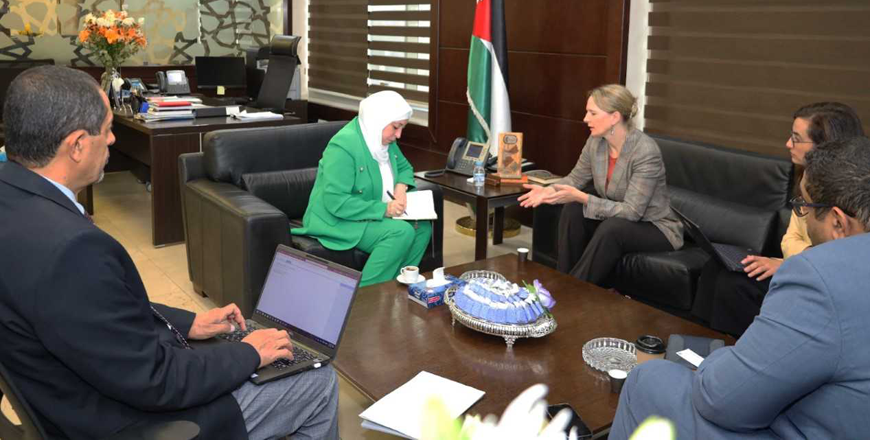You are here
New Transport Sector Strategy seeks to pave path to modernisation
By Batool Ghaith - Jun 29,2022 - Last updated at Jun 29,2022
AMMAN — The Ministry of Transport on Wednesday said that the New Transport Sector Strategy (2022-2027) is based on activating partnerships with the private sector, in addition to grants.
According to a ministry statement, it has been developing the new strategy in cooperation with all sector partners since the middle of 2021, and in time for the launch of the Economic Modernisation Vision and the completion of the National Economic Workshops at the Royal Hashemite Court.
The ministry is working in cooperation with a team from the World Bank and the European Union to align the initiatives within the transport sector strategy for 2022-2027, and to translate them into operational plans to include strategic objectives related to all the initiatives mentioned in the Economic Modernisation Vision, the ministry said.
The updated strategy document takes a comprehensive look at the transport sector’s issues. It is based on the analysis of project costs and proposes other funding sources to bridge the large financing gap in transport sector projects, such as the general budget and generating revenue from the transport sector, as well as establishing partnerships with the private sector and securing grants, the statement noted.
Economist Husam Ayesh noted that many previous strategies were not taken seriously, as they did not tap into “real issues” in order to create a developed transport sector and did not have an impact on solving the sector’s problems.
“In recent years, citizens’ use of transport has increased by 90 per cent, while the transport sector has increased in size by about 40 per cent, which indicates that there is a shortcoming in the sector with regard to meeting citizens’ needs,” Ayesh told The Jordan Times.
Ayesh noted that many roads suffer from neglect, lack of maintenance, and delays in projects’ implementation.
“Partnership with the private sector has become an obvious need, as the private sector can implement and work on the projects required to develop the transport sector,” he continued.
He noted that solving problems with and developing the transport sector will upgrade Jordan to new economical paths, a factor that will attract investors.
“Partnership with the private sector must be within the sector’s capabilities and within the services it can offer, and this depends on the project and its strategic objectives,” he added.
Regarding the proposed idea of charging fees for using new roads, Ayesh indicated that the quality of the roads must justify the fee for using it.
Economist Wajdi Makhamreh “doubted” the private sector’s ability to solve the transport sector’s problems.
“If there are no incentives or privileges for the private sector to support the transport sector and investment in it, and if there is no government orientation, there will not be any benefit from a partnership with the private sector,” Makhamreh told The Jordan Times.
He noted that previous governmental transport strategies failed to stimulate the sector.
“There must be a strategy to modernise transport and ensure its smoothness, which would be extremely beneficial for the economy. There would be transport connecting governorates which would also lead to investment between governorates,” he added.
According to Makhamreh, it will be very costly to achieve that within the new strategy, because Amman’s demographics would not allow it due to a lack of infrastructure for modern transport.
Khamees Tawalbeh, a Jordanian citizen, expressed his hope for the transport sector’s modernisation, and especially for the roads in Jordan.
“The streets in Jordan, across the governorates, need reconstruction as they are full of pits,” he told The Jordan Times.
Tawalbeh demanded new means of public transport to meet the needs of everyone in the Kingdom, especially in the capital, Amman.
“With the increasing population, we are in desperate need of new means of public transport such as metros or even trains, which I believe will help decrease traffic jams, as well as ease the journey from one place to another,” he added.
Related Articles
AMMAN — While toll roads can provide an additional revenue stream for infrastructure development, careful consideration must be given
AMMAN — Beyond its environmental impact, renewable energy represents an effective way to achieve economic sustainability, economists suggest
AMMAN — Transport Minister Wissam Tahtamouni and Holly Benner, the World Bank's resident representative in Jordan, discussed means of streng

















